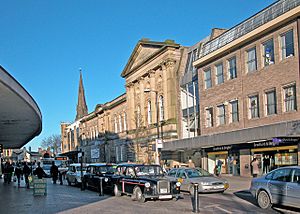Derby Hall, Bury facts for kids
Quick facts for kids Derby Hall |
|
|---|---|

The Derby Hall, with Athenaeum House on the right
|
|
| Location | Bury |
| Built | 1850 |
| Architect | Sydney Smirke |
| Architectural style(s) | Neo-classical |
|
Listed Building – Grade II
|
|
| Designated | 3 February 1971 |
| Reference no. | 1067239 |
| Lua error in Module:Location_map at line 420: attempt to index field 'wikibase' (a nil value). | |
The Derby Hall is a beautiful old building in the center of Bury, Greater Manchester, England. It was built a long time ago, during the Victorian era. The building has a classic look, like ancient Greek or Roman buildings. It is so special that it is officially protected as a Grade II listed building.
Contents
A Look Back: Derby Hall's Story
The Derby Hall was built in the late 1840s. A very important person named Edward Smith-Stanley, 13th Earl of Derby wanted it built. He was a powerful leader in the area.
Who Designed This Building?
A famous architect named Sydney Smirke designed the Derby Hall. He was also known for designing the round reading room at the British Museum. The Derby Hall has a special central window and a triangular shape above its entrance.
How Derby Hall Changed Over Time
The building started being built in December 1848. It was finished in October 1850. The hall officially opened on November 6, 1850. Six hundred people came to a concert to celebrate!
The Derby Hall was once part of a bigger group of buildings. These included the Derby Hotel and the Athenaeum. Sadly, these other buildings were taken down in the 1960s and 1970s.
What Was Derby Hall Used For?
When it first opened, the building was called the Public Rooms. But people quickly started calling it the Town Hall. It held a court, a police station, and offices for the Earl of Derby. There was also a big room for meetings and events.
The Earl of Derby hoped the building would be used by Bury's local government. However, there was a disagreement, so it wasn't used that way at first.
After the First World War, the local government bought the building. They used it as their main office for many years. In 1954, the council moved to a new building.
Since 1979, the Derby Hall has been used for arts and entertainment. A charity called Bury Metropolitan Arts Association runs it. Today, it is known as The Met. It is a popular place for theatre shows and concerts.
See Also
- Listed buildings in Bury
 | Isaac Myers |
 | D. Hamilton Jackson |
 | A. Philip Randolph |

